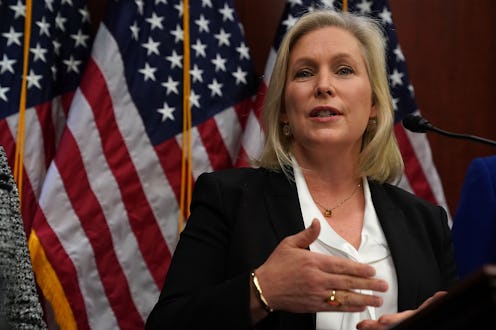News
22 Democrats Call For The Government To Study How Much Harassment Really Costs Women

On Monday, 22 Democratic senators sent a letter to the Labor Department demanding they investigate how sexual harassment affects women's financial security. The group, which includes Sens. Kirsten Gillibrand, Elizabeth Warren, Kamala Harris, Cory Booker, and Bernie Sanders, is asking top officials to start collecting more and better data about harassment in the U.S. workforce.
Addressed to the Secretary of Labor Alexander Acosta and Bureau of Labor Statistics Acting Commissioner William J. Wiatrowski, the letter requested the department collect data concerning "prevalence and cost of sexual harassment," BuzzFeed News reported. More specifically, the senators want the department to conduct a study on the economic impact of sexual harassment on the labor force as a whole and on individual workers.
Some possible economic repercussions the senators said they would like to know more about are lost incomes and retirement savings. They also want the government to study the impact sexual harassment may have on labor force participation rates.
According to Gillibrand, the inspiration for the letter came from a BuzzFeed News story about sexual harassment across a wide range of industries. After looking at every sexual harassment claim filed between fiscal years 1995 and 2016 with the U.S. Equal Employment Opportunity Commission, BuzzFeed compiled a list of how many instances of sexual harassment occurred in particular industries. The industry where harassment was the most prevalent was full-service restaurants, with more than 10,000 claims filed.
A recent ABC News-Washington Post poll found that more than half of American women (54 percent) have experienced "unwanted and inappropriate sexual advances" at some point in their lives. Thirty percent reported enduring sexual harassment from male colleagues and 25 percent said their harassers had sway over the future of their careers.
With millions of women facing sexual harassment every day, it can cause repercussions beyond physical, mental, and emotional. It can impact their wallets.
Victims of sexual harassment often have to take sick time or unpaid leave in order to deal with the repercussions of workplace discrimination, according to Sagar Shah, an associate in the Litigation Practice Group of Eisenberg and Baum, LLP. If conditions in their office worsen, some victims are forced to quit, leaving them without income. In cases where the harasser has more power in the workplace, a victim can be fired for declining sexual advances or sometimes as retribution for reporting harassment.
"These losses add up," Shah writes.
In one person's life, the loss of employment, particularly if he or she is fired, can cause a cascade of financial problems that continue for years. An unfavorable termination may make it difficult for the sexual harassment victim to find job references or replacement employment.
Some women who've come out against their harassers have said they're now "unemployable" after blowing the whistle on a sexually abusive coworker. "You are still going up against the old boys network," said former legal secretary Rena Weeks, who won a sexual harassment lawsuit against the Baker & McKenzie law firm in 1994, to USA Today.
Fortunately, the tide looks like it's beginning to turn in women's favor. Engineer and entrepreneur Niniane Wang, along with five other women, publicly accused venture capitalist Justin Caldbeck of making sexual advances when they met to discuss business. But, Wang waited until she had all the evidence she needed, reaching out to Caldbeck's partners and other women who've been harassed by him. Now, instead of being shunned, Wang is asked to speak at major industry conferences — and Caldbeck was forced to resign.
"We focus a lot on courage but the behind-the-scenes work is equally important," Wang said. "If you have a plan and enough evidence, it is also easier to muster up the courage."
But since stories like Wang's are still the exception, not the rule, it's important to look at how workplace harassment is affecting women and their financial security. Hopefully, the Labor Department will come away with some valuable insights so we can make sure no woman has to pay for her harassers in more ways than one.